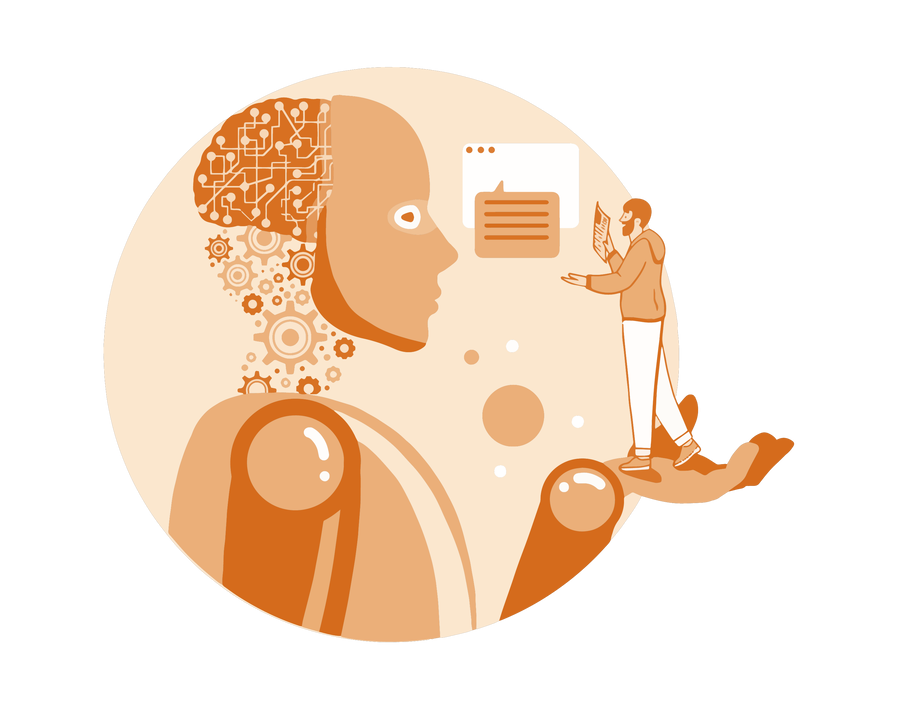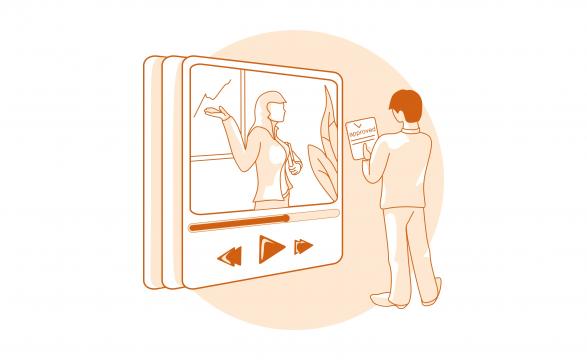
AI recruiting has the potential to revolutionize the recruitment process by
leveraging Artificial Intelligence (AI) technologies to streamline and
enhance various aspects of hiring.
AI-driven recruiting tools can significantly improve the efficiency and effectiveness of the recruitment process by automating hiring tasks throughout the process, eliminating biases, and providing data-driven insights so companies can hire the best talent on the market for a specific job position.
What is AI Recruiting?
It involves using automated systems and AI-powered recruiting software to streamline and optimize various aspects of the recruitment process, including sourcing, screening candidates, evaluating, and selecting job seekers.
Artificial Intelligence recruiting can automate time-consuming and repetitive tasks. In addition, AI-driven recruiting systems eliminate human bias and preconceptions that may inadvertently influence the job seekers’ evaluation process.
When discussing the importance of AI recruiting workflow, it’s essential to mention that AI tools allow recruiters to efficiently search for job seekers across various platforms, databases, and social networks, widening the talent pool and increasing the chances of finding the most qualified candidates.
Hiring teams can make better decisions and increase the likelihood of finding candidates who can positively impact the organization. Such systems can handle candidate outreach, allowing hiring teams to scale their recruitment efforts without compromising quality or efficiency.
The Impact of AI Recruiting on the Hiring Process
AI recruiting significantly impacts the hiring process, revolutionizing various stages of talent acquisition.
Here are the critical steps involved in the hiring process and how AI recruiting influences them:
-
Sourcing:
Automated tools can match candidate profiles with job requirements, helping recruiters identify potential candidates efficiently. -
Screening and Assessment:
AI systems can use machine learning and automate resume screening, analyzing keywords, qualifications, and experience to identify the most relevant candidates. Online assessments powered by Artificial Intelligence algorithms can accurately evaluate candidates’ skills and cognitive abilities.
-
Selection and Decision-making:
AI-based tools can provide data-driven insights and predictive analytics, helping recruiters spend time usefully and make informed decisions about candidate selection. Automated candidate ranking and scoring systems can prioritize the best candidates based on predefined criteria, streamlining the decision-making process. AI can assist in identifying patterns and trends among successful hires, enabling recruiters to identify top-performing candidates for the job position.
Companies can implement the following techniques and strategies to achieve a successful talent acquisition process:
- Develop a strong employer brand - highlighting the company’s values, culture, and opportunities. Leverage AI to determine culture fit and analyze candidate sentiments and feedback to improve employer branding efforts continuously.
- Build and maintain the best talent pool - by leveraging AI tools for proactive sourcing and nurturing relationships with potential candidates. Implement AI-powered CRM systems to engage and stay connected with candidates.
- Utilize AI analytics to gather insights - from candidate data and track key metrics throughout the hiring process. Analyze hiring data points to identify bottlenecks, optimize recruitment strategies, and improve overall talent acquisition effectiveness.
- Use AI-powered tools - and machine learning to analyze job descriptions and remove gendered language, promoting diversity and inclusion.
When discussing tools and technologies for the practical work of talent acquisition professionals, it’s worth mentioning Playhunt. Our AI-based platform utilizes advanced algorithms and data-driven insights to optimize your next hiring campaign.
Playhunt offers screening resumes, analyze CVs, and identify qualified candidates based on job requirements. Its CRM capabilities allow recruiters to manage and engage with candidates throughout the hiring process.
There’s also personalized communication, automated updates, and feedback management to enhance the candidate experience.
Increasing Efficiency ☝🏼
- AI recruiting can significantly reduce the time it takes to fill a position by streamlining various stages of the hiring process. Automated candidate, sourcing, and screening algorithms quickly identify qualified candidates, saving time spent manually searching and reviewing resumes. Streamlined workflows and automated processes ensure hiring tasks progress smoothly without unnecessary delays.
- Such a recruiting workflow automates various administrative tasks associated with talent acquisition, freeing recruiters’ time for more strategic activities. Artificial Intelligence algorithms review resumes, extract relevant information, and rank candidates based on job requirements.
Easing the Hiring Process ☝🏼
AI recruiting brings objectivity and consistency to the hiring process by reducing human biases and ensuring standardized evaluations.
AI algorithms assess candidates based on predefined criteria, eliminating subjective judgments and prejudices arising from human interaction in the decision-making process. Standardized evaluation criteria and automated scoring systems ensure that each candidate is assessed using the same metrics, promoting equal opportunities and fairness.
AI-powered tools can detect patterns and correlations among successful hires, enabling organizations to identify the qualities and characteristics that lead to high-performing employees.
In addition, automated sourcing tools help expand the talent pool by searching for candidates across various platforms and networks, ensuring a wider reach and increasing the chances of cooperating with top talent.
Enhancing Candidate Experiences ☝🏼
- AI recruiting improves candidate experiences by streamlining communication throughout the recruiting process. Communication systems send personalized messages and notifications to candidates, keeping them informed about the next steps, interview schedules, and any changes in the recruiting process. AI facilitates seamless collaboration between recruiters, hiring managers, and candidates, ensuring everyone can access the necessary information and reducing communication gaps.
- AI recruiting enables personalized experiences for candidates, making them feel valued and engaged throughout the hiring journey. The algorithms can analyze candidate data, and automated systems provide customized recommendations and suggestions based on candidates’ skills, preferences, and career goals, helping them find the most suitable job opportunities. AI-powered interview platforms can adapt the interview experience to match candidates’ preferences, such as offering video or in-person interviews, accommodating time zone differences, and providing interview practice materials. Personalized feedback and insights generated by AI systems can offer candidates valuable guidance on areas for improvement, helping them grow professionally.
Use Cases of AI Recruitment Process
Resume Screening
- AI algorithms screen resumes and identify critical qualifications, skills, and experiences needed for a particular job.
- By automating resume screening, AI can save time and effort for recruiters, enabling them to focus on qualified candidates.
- AI flags inconsistencies or gaps in resumes, helping recruiters make more informed decisions during the initial screening phase.
Candidate Sourcing
- AI searches and analyzes vast candidate data from multiple sources, including job boards and, hiring through social media platforms and professional networks.
- By using AI-powered candidate sourcing tools, recruiters can quickly identify potential candidates who match specific job requirements and qualifications.
- AI algorithms proactively look for passive candidates by analyzing their online presence and identifying individuals with relevant skills and experience.
Interviews
AI can assist in various aspects of the interview recruiting process, enhancing efficiency and effectiveness:
- Video Interviewing: AI-powered hiring platforms can analyze candidates’ tone and body language during video interviews, providing insights to assess their fit for the role.
- Chatbots and Virtual Assistants: AI-driven chatbots can conduct initial screening interviews, ask pre-screening questions, and evaluate candidate responses.
- Interview Scheduling: Such tools can automate interview scheduling, taking into account the availability of interviewers and candidates and reducing coordination efforts.
Onboarding
AI systems assist in organizing and managing new hire documentation, such as contracts, NDAs, and tax forms, ensuring a smooth onboarding experience.
They can guide new hires through onboarding, providing information, answering questions, and facilitating their integration into the company.
Applicant tracking software can analyze new hires’ profiles and recommend personalized onboarding plans, including training modules, mentorship programs, and orientation materials.
The Future of AI Recruiting 👾
Advancements in AI Technology
- AI recruiting technology will continue to advance, enabling more sophisticated and intelligent recruitment systems.
- NLP and NLU capabilities will improve, allowing AI systems to understand and interpret human language more effectively, including resumes, job descriptions, and candidate interactions.
- Machine learning algorithms will become more refined and accurate, providing better candidate recommendations, predictive analytics, and decision-making support.
Enhancing AI-Human Collaboration
- The future of AI recruiting lies in augmenting human capabilities rather than replacing them.
- Recruiters will focus on building relationships, strategizing, and making final hiring decisions while leveraging AI tools for administrative tasks, data analysis, and candidate sourcing.
- AI-powered tools (virtual assistants) will become more sophisticated, providing personalized and context-aware support to recruiters and candidates and enhancing the hiring experience.
Change in HR Ecosystem
- AI recruiting will reshape the HR ecosystem, creating new roles and skill requirements.
- Hiring managers must develop a deeper understanding of AI technologies, data analysis, and predictive modeling to leverage AI effectively in recruitment.
- Roles such as AI recruitment software, strategists, data analysts, and AI ethics officers may emerge to guide organizations in adopting ethical and responsible AI practices.
- The HR teams will increasingly focus on strategic workforce planning, talent development, and creating inclusive and diverse AI recruitment tools.
Challenges of AI Recruiting
Data Privacy and Security
AI recruiting relies heavily on collecting and analyzing candidate data, raising concerns about data privacy and security.
Companies must ensure compliance with data protection regulations and establish robust security measures to safeguard sensitive candidate information.
Transparency in data-driven insights collection and usage practices is essential to gain candidate trust and maintain ethical standards.
Adoption of AI Technology
Widespread adoption of AI recruiting software may pose challenges for organizations, particularly smaller companies with limited resources and technological infrastructure.
Upgrading existing systems, training staff, and integrating AI technologies into existing recruitment processes can be complex and require substantial investment.
Legal and Ethical Implications
AI recruiting raises legal and ethical concerns regarding privacy, discrimination, and fairness. Companies must adhere to applicable laws and regulations, such as anti-discrimination laws, when using AI in recruiting to ensure fair treatment of the best-fit candidates.
In addition, ethical considerations, such as transparency, explainability, and accountability of AI systems, should be addressed to maintain trust and integrity in the recruiting process.
Legal frameworks and industry standards are still evolving in response to the rapid advancements in AI recruiting technology, requiring ongoing vigilance and adaptation.
Hire Smarter Using AI Recruiting Tools
Playhunt is AI recruiting software that offers a range of features to help organizations hire more competent and more efficiently.
It utilizes AI algorithms to source and assess candidates from multiple platforms, analyzes vast amounts of job seekers’ data, and identifies individuals with the right skills and qualifications, expanding the talent pool and increasing the possibilities of finding top talent.
Playhunt helps recruit teams by automating the resume screening process using Artificial Intelligence technology.
It can quickly scan and analyze resumes, extracting relevant information and ranking the best-fit candidates based on job requirements. In addition, Playhunt’s AI-powered technology scheduling tool simplifies the recruiting process of setting up interviews.
It considers the availability of interviewers and quality candidates and automates the scheduling of interviews, eliminating the need for back-and-forth communication and reducing scheduling conflicts.
This service helps to embrace AI possibilities and provides assessment AI recruiting tools to evaluate candidates’ skills and competencies. The platform also offers analytics capabilities to track and analyze candidate data, enabling recruiters to identify patterns, trends, and success factors in their recruiting process.
Playhunt facilitates seamless collaboration between recruiters, hiring managers, and candidates. AI in recruiting offers features such as candidate messaging, interview feedback sharing, and centralized candidate profiles, ensuring all stakeholders have access to the necessary information and promoting effective communication throughout the hiring process.
Create an account for free today, and start automating your hiring process to save your business money and time in the long run.







